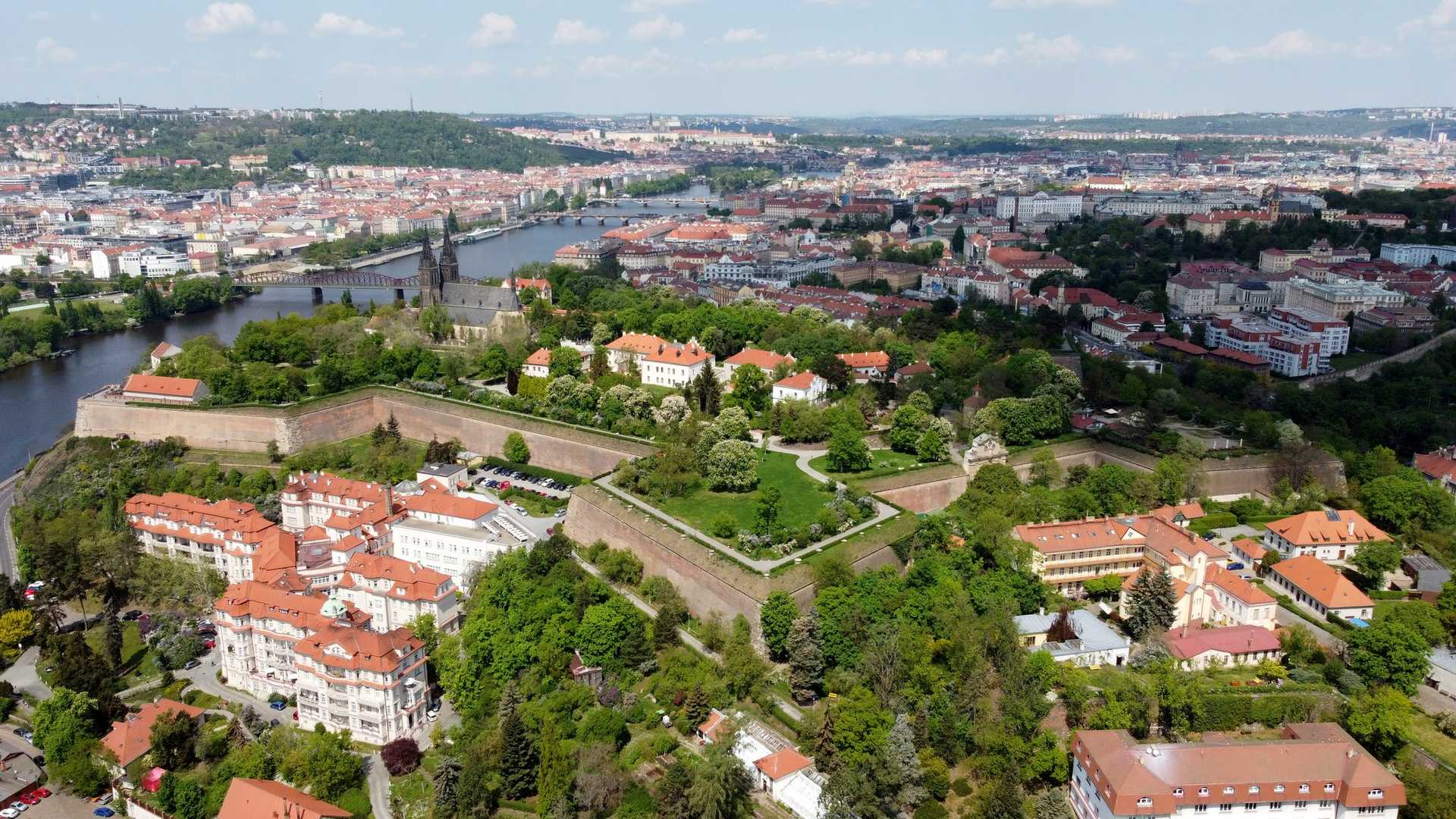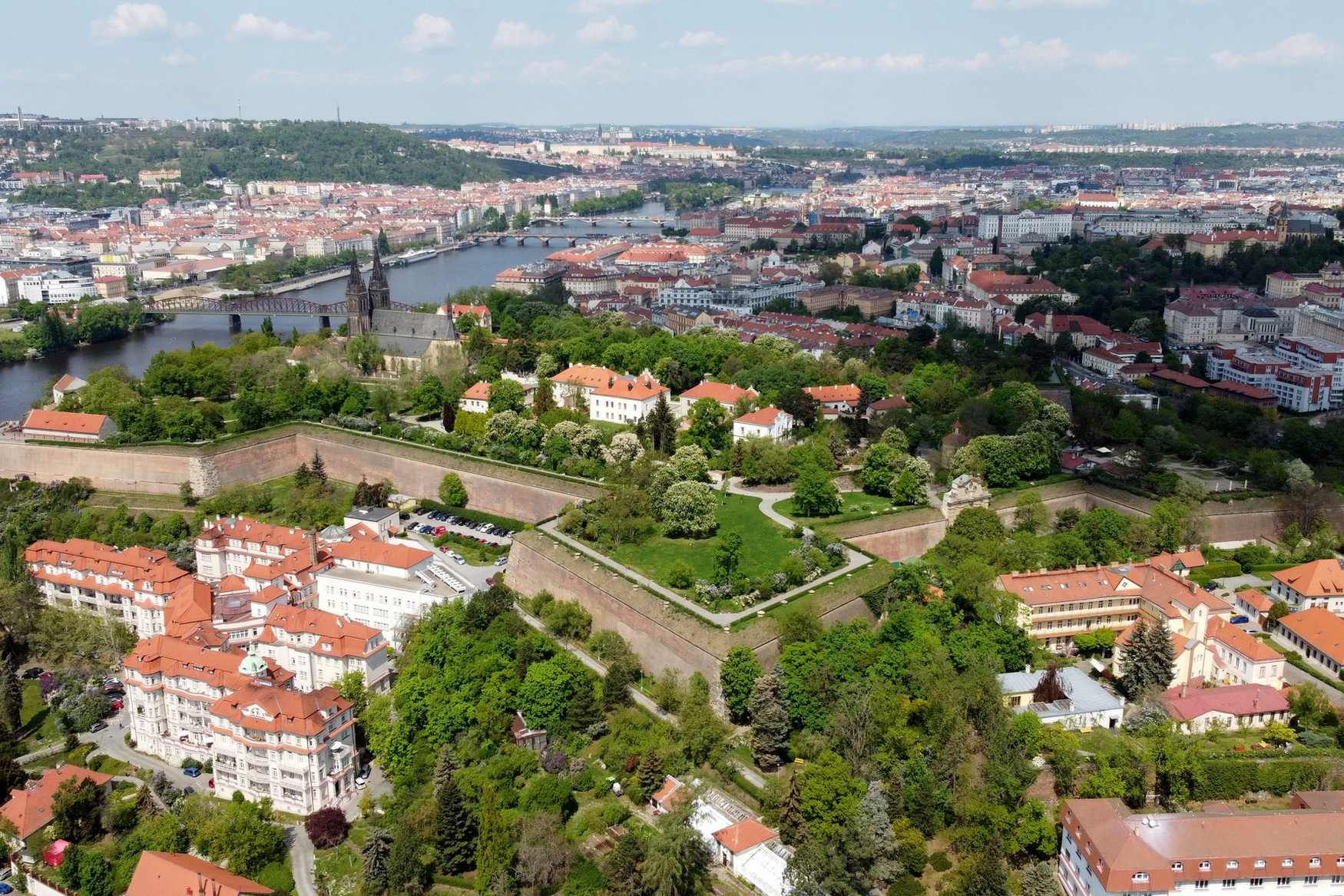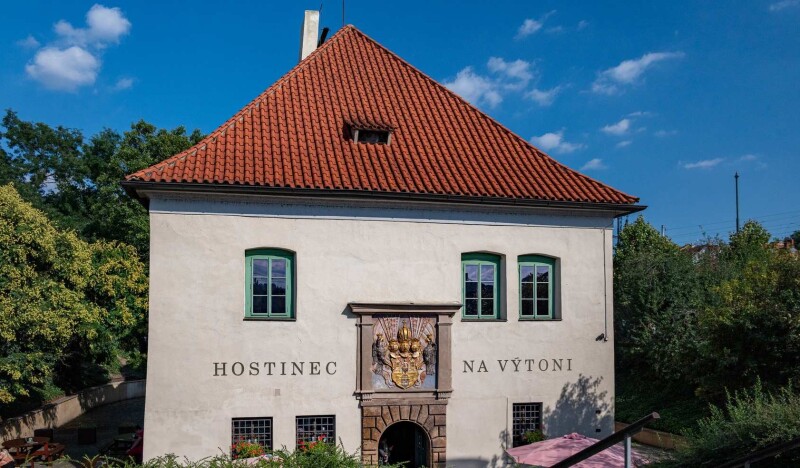Located just over 3 km southeast of Prague Castle, on the east bank of the Vltava River, the ancient fortress of Vyšehrad (Czech for "upper castle") offers a journey into Czech history with panoramic views that serve as a majestic backdrop for family photos. This less frequented attraction provides a tranquil escape from the bustling city center, where families can unearth the tales of Czech dukes, walk through lush parks, and marvel at the intricate architecture of the Basilica of St. Peter and St. Paul. The site not only echoes old legends but is also a place where children can frolic freely in open spaces, making it an ideal spot for parents looking to blend education with entertainment.
The importance of Vyšehrad in Czech history is monumental, as it was the first seat of Czech dukes and later became the final resting place for many of the nation's most prestigious composers, artists, and writers in Vyšehrad Cemetery. As parents guide their little ones through the cemetery's art and history, it's an opportunity to introduce them to the lives of significant figures such as Antonín Dvořák and Alfons Mucha. The open parklands surrounding Vyšehrad Fortress allow for impromptu picnics and space for kids to play, ensuring that a visit here is as relaxing as it is enriching.
With the timeless structure standing robustly on a high promontory above the Vltava River, families visiting Vyšehrad can also indulge in some of Prague's best views. After exploring the fortress, families can stroll along the river, capturing kids' smiles against the picturesque landscape. Vyšehrad is more than a historical site; it's an experience that combines the past with the beauty of the present, making it a must-visit for any family traveling through Prague.
Contents
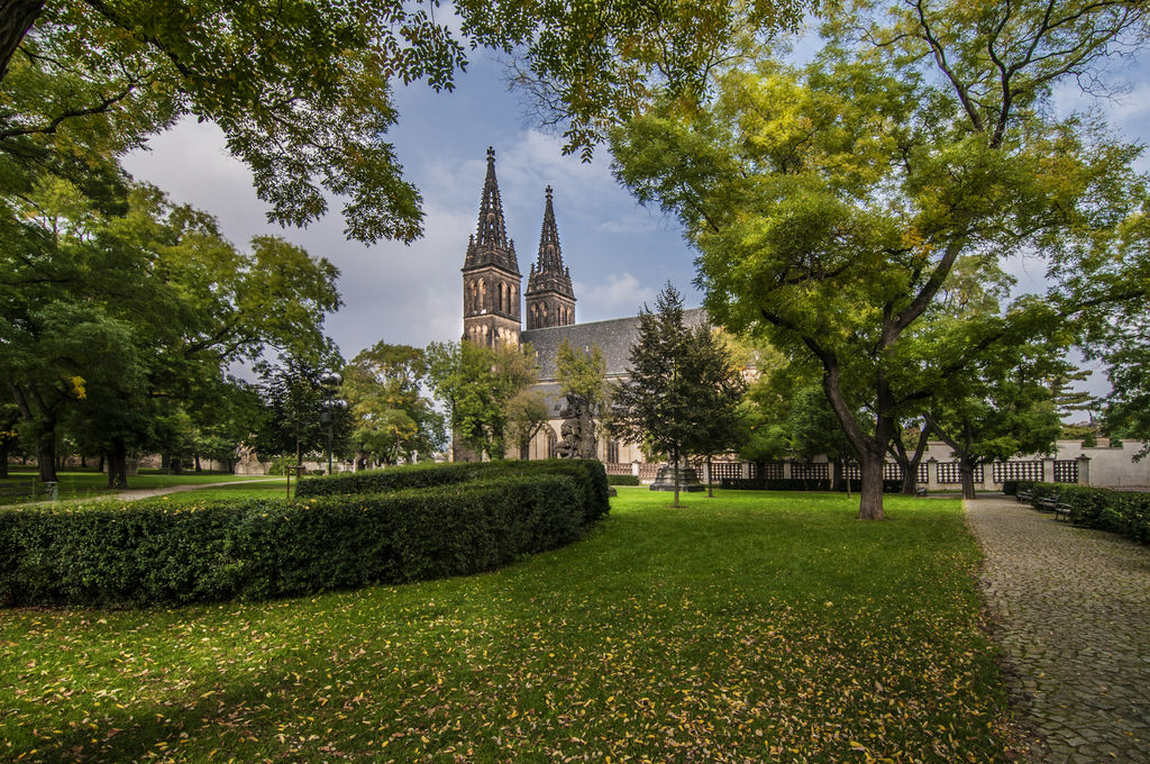 Photo:https://www.praha-vysehrad.cz/
Photo:https://www.praha-vysehrad.cz/
What is Vysehrad Known for?
Vysehrad is steeped in legend and history, acting as a sentinel on the banks of the Vltava River. Known for its pastoral atmosphere and cultural significance, this historic fortress offers a peaceful retreat from the bustling city center of Prague. Families often visit Vysehrad to enjoy the open spaces and the leisurely atmosphere.
- Legends and Royalty: It's said to have been the first seat of Czech dukes, and the lore suggests it's the resting place of the mythical Princess Libuše, who prophesied the glory of Prague.
- Architectural Marvels: The compound houses the Basilica of St Peter and St Paul, a neo-Gothic church with striking twin spires that dominate the skyline.
- Artistic Emanation: Visitors can explore the Vysehrad Cemetery, where many famous Czechs are buried, including composers Antonín Dvořák and Bedřich Smetana.
- Panoramic Views: With its vantage point from the hilltop, Vysehrad offers some of Prague's most beautiful panoramic views, ideal for family photos.
- Entertainment for Kids: The expansive fortress grounds give children plenty of room to play. At the same time, the on-site playgrounds ensure they remain entertained.
By visiting this place, families can immerse themselves in the essence of Prague's history, enjoy profound views, and partake in a serene atmosphere away from the more crowded tourist spots of the city. Whether it's understanding the rich tapestry of local myths, appreciating the artistry of ancient Czech architecture, or simply enjoying a family picnic in a historic setting, Vysehrad promises a fulfilling outing for visitors of all ages.
Why It Might Be Interesting for Kids
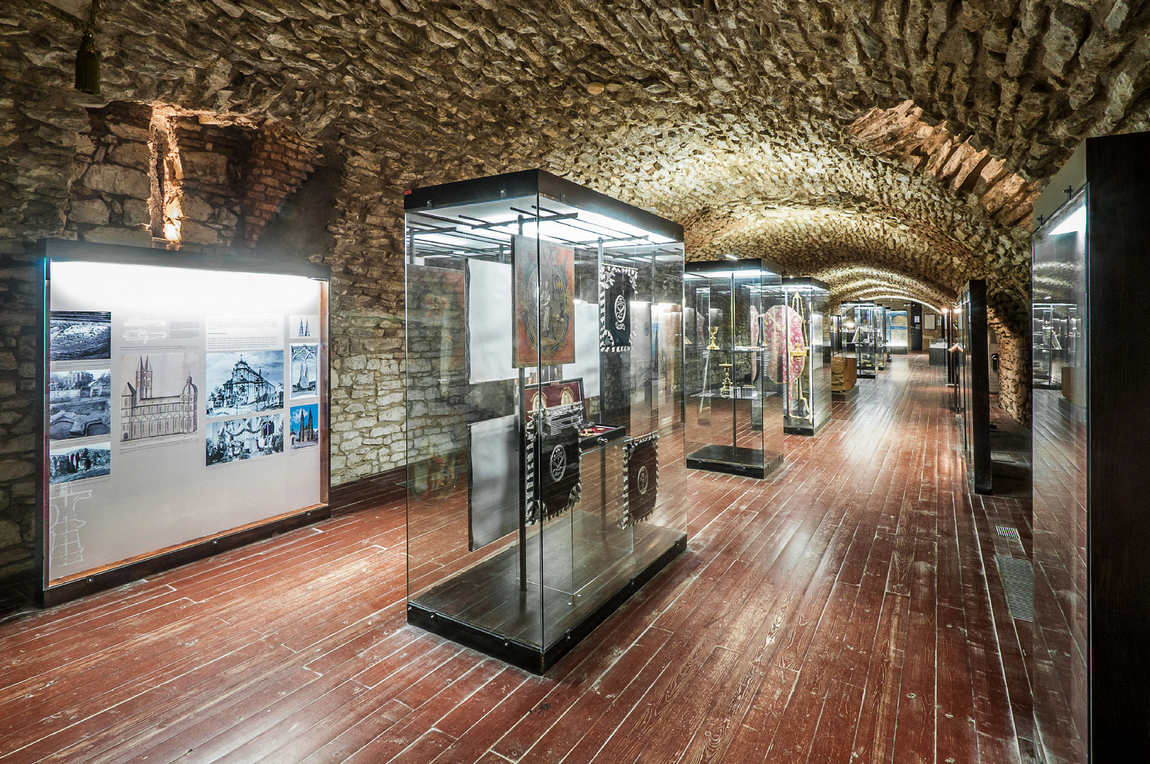 Photo:https://www.facebook.com/prahavysehrad
Photo:https://www.facebook.com/prahavysehrad
Visiting this spot can be a fascinating experience for children of various ages, offering educational value and room for imaginative play. The historical fortification brings a touch of adventure to family outings, ensuring that kids remain engaged throughout the visit. Here are the main reasons to visit Vysehrad with your children:
1. Exploration of Ancient Fortifications: Children often naturally enjoy exploration. This castle, with its ancient walls and ruins, provides a real-life castle experience that can spark their imagination. Young adventurers, especially those between 6 and 12, will find the ramparts and battlements an exciting maze.
2. Awe-Inspiring Legends and Folklore: Every child loves a good story, and Vyšehrad castle is rich in mythical tales. Tales of brave knights and legendary figures can capture the minds of the young. Visiting Vysehrad turns these stories into a tangible reality that children can experience firsthand, suitable for ages 5 and up.
3. Engaging Cultural Exhibits: Kids with a budding interest in history will appreciate the exhibits here. They offer an educational glimpse into the past without being overwhelming, perfect for children aged 7 and above who can learn about the site's cultural significance.
4. Green Spaces for Play: Families can enjoy the lush green spaces around the castle after soaking in some history. It's the ideal spot for a picnic or simple relaxation. These areas offer a safe environment for children to play and are suitable for all ages.
5. Stunning Views for the Whole Family: Families with older children, particularly those above 10, will be mesmerized by the breathtaking panoramas of Prague from Vysehrad. It's a perfect opportunity for teaching youngsters about urban landscapes and geography in a fun and memorable way.
Overall, Vysehrad can provide a well-rounded visit for families, combining education with entertainment in a setting that feels both grand and accessible.
1, 3 km from the castle is the Czech Police Museum, which we recommend visiting with the whole family.
History of Vyšehrad
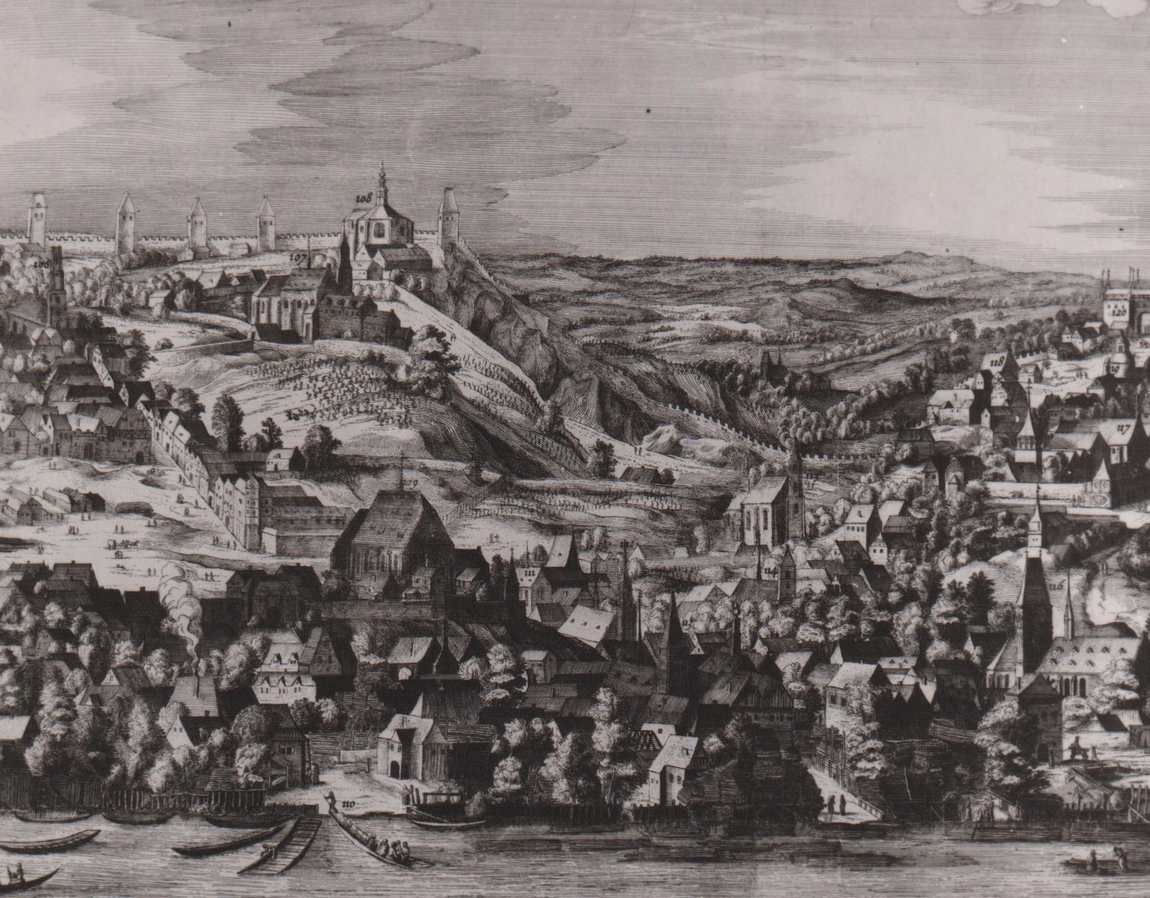
Photo:https://www.facebook.com/prahavysehrad
Nestled on a high rock above the Vltava River, Vyšehrad holds a special place in the annals of Bohemian history, with its origins shrouded in legend and its grounds steeped in the history of the Czech nation.
Origins and Early History
This place, believed by many to be the birthplace of Prague itself, traces its roots back to the 10th century. It's said that Princess Libuše prophesied the glory of Prague from this very spot. Archaeological evidence shows it as a significant settlement, even housing a mint for Boleslav II, suggesting its importance in medieval Bohemia.
Royal Significance
The fort also served as a royal residence. By the 11th century, a royal palace stood within its walls, signifying Vyšehrad's crucial role in the Přemyslid Dynasty. During the reign of Charles IV, Holy Roman Emperor the castle saw significant development as part of his grand vision to make Prague the jewel of the Holy Roman Empire.
But later in the 12th century, the seat of power was moved to a place we know as Prague Castle, and Vysehrad was abandoned. However, the fortress fell into disrepair afterward; it never lost its symbolic weight in Czech history.
Hussite Wars and Beyond
During the Hussite Wars, the Battle of Vyšehrad was a series of engagements at the start of the conflict between Hussite forces and Catholic crusaders sent by Emperor Sigismund. The battle occurred at the castle of Vyšehrad from 16 August 1419 to c. 1 November 1420. The Hussites, led by figures such as Hynek Krušina of Lichtenburg, successfully defended the castle against the Catholic crusaders, with casualties estimated at around 30 killed on the Hussite side and about 500 on the side of their enemies.
The historical fortress in Prague was plundered and destroyed during the Hussite wars. Still, its faded glory was restored in the second half of the 17th century, turning it into a Baroque military fortress.
From Habsburg to Today
In the 17th century, Vyšehrad transformed into a Baroque fortress under the Habsburgs. Today, it stands proudly as a National Cultural Monument, where families can explore centuries-old chapels, delve into the country's intriguing history, and immerse themselves in legends that have captivated generations.
Architectural Highlights
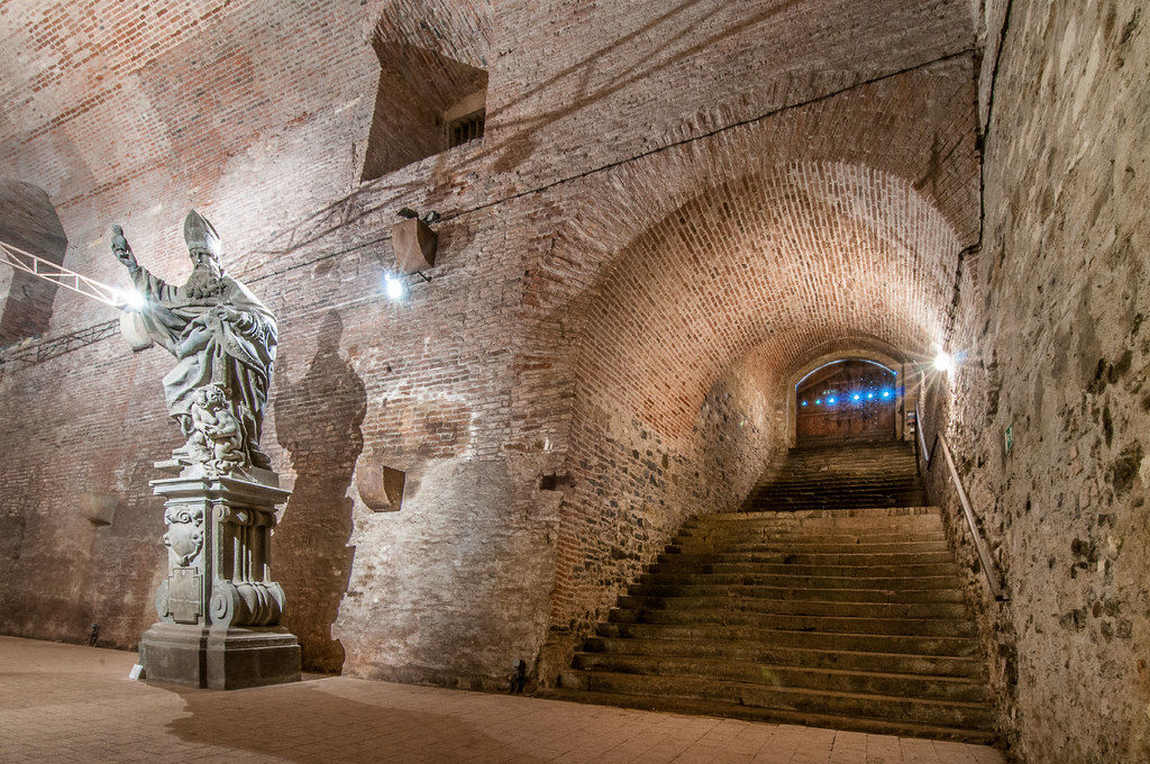 Photo:https://www.facebook.com/prahavysehrad
Photo:https://www.facebook.com/prahavysehrad
Vyšehrad, a testament to Prague’s rich past, presents an architectural portfolio spanning various epochs, from Gothic and Neo-Gothic marvels to Baroque influences and formidable fortifications. The area is an expanse of historical significance and a canvas showcasing the evolution of architectural trends within the Czech capital.
Gothic and Neo-Gothic Styles
At the heart of Vyšehrad stands the Basilica of St. Peter and St. Paul, a structure whose twin steeples punctuate the skyline in a distinctive display of Neo-Gothic renovation. Initially founded in the 11th century, the basilica's current form took shape under architect Josef Mocker in the 1880s. The interiors are equally impressive, featuring a rich tapestry of art nouveau frescoes.
The Gothic Church of Decollation of St. John the Baptist is remarkable in Vysehrad, Prague. It was built in the second half of the 14th century as a two-nave hall-type edifice. The church survived the Hussite Wars, but the transformation of Vyšehrad into a Baroque fortress led to its destruction. Today, only modest fragments of the church remain in the mound of the bastion ramparts behind the Baroque chapel. Despite its ruined state, the church remains a popular attraction for visitors to Vysehrad, offering a glimpse into the area's rich history and architectural heritage.
Rotundas and Baroque Additions
Among the oldest edifices within Vyšehrad is the Romanesque Rotunda of St. Martin, a cylindrical structure emblematic of Prague's medieval era. The presence of rotundas accentuates the site's historical depth. At the same time, Baroque elements can be woven into the architectural narrative, especially in structures refurbished or constructed during that time frame.
Defensive Structures
Designed as a fortress, Vyšehrad's ramparts and fortifications are a narrative in stone of Prague's defensive history. The robust Peak Gate, bastions, and arcades stand as a testament to the strategic importance of this citadel. Visitors may also explore the underground casemates, a network of passages with strategic military significance. Here, you can also see the originals of some statues from Charles Bridge.
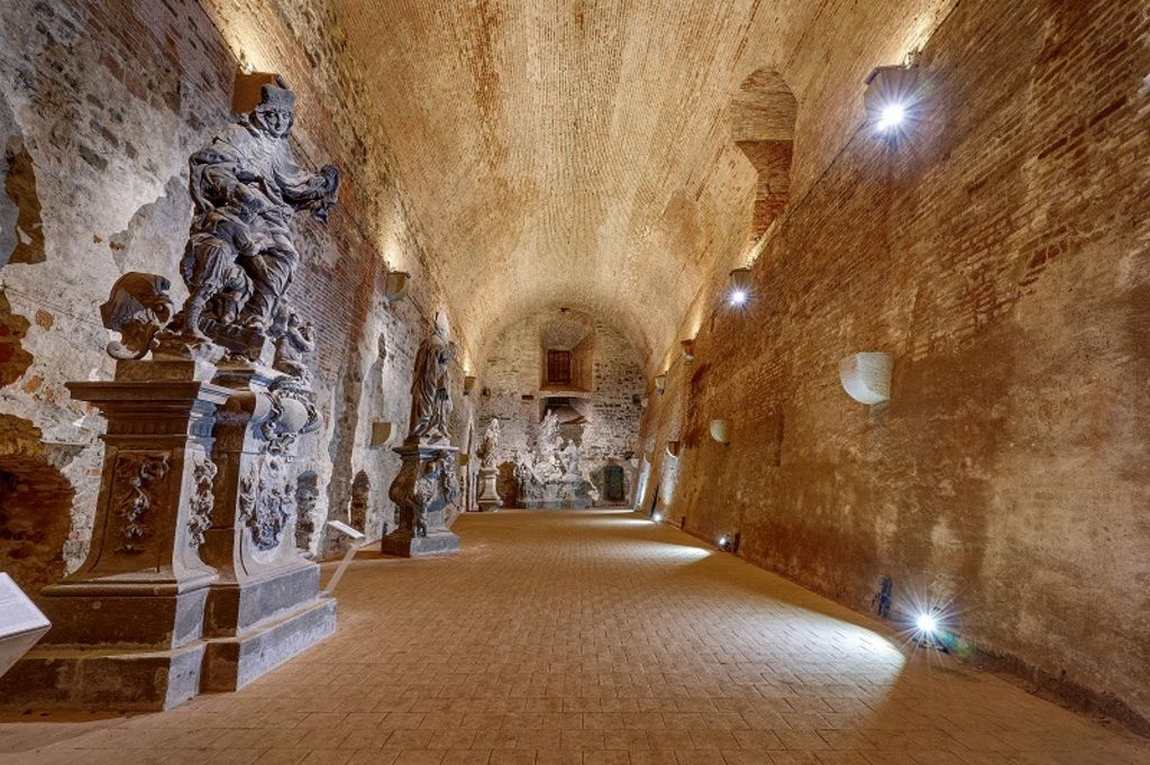 Photo:https://www.praha-vysehrad.cz/
Photo:https://www.praha-vysehrad.cz/
The Final Resting Ground
It is an architectural wonder and the final resting ground of many notable Czech figures. Within the Cemetery, one finds Slavín, a mausoleum exhibiting an intricate overlay of Gothic and Neo-Gothic styles. It’s a place where families can pay respects to the cultural icons and weave stories of the influential personalities that shaped Czech history, such as Bedřich Smetana and Antonín Dvořák and the writers Karel Čapek and Jan Neruda.
Cultural Significance
Vyšehrad has long been a crucible of Czech culture, history, and legend. The fortress seems to whisper the tales of yesteryears, echoing through its ancient walls and within its hallowed cemetery where the nation's luminaries rest.
Literary and Mythic Inspirations
This place serves as a profound wellspring for Czech literary works and myths. According to legend, Princess Libuše, a prophetess and the founder of the Přemyslid dynasty foresaw Prague's glory from this very spot. The enduring allure of Vyšehrad is immortalized in texts such as the Manuscripts of Dvůr Králové and Zelená Hora, underscoring its integral role in the Czech Republic's legendary landscape.
Art and Music
The artistic legacy of Vyšehrad is inextricably linked with figures like Bedřich Smetana and Antonín Dvořák. Smetana's musical composition "Vltava" from the cycle Má vlast is inspired by the river that flows past the fortress walls, weaving the soul of Vyšehrad into the national consciousness. Dvořák and many others have found their eternal resting place in the on-site cemetery, further anchoring Vyšehrad’s significance in art and music.
Vysehrad in Czech Identity
Declared a National Cultural Monument, the castle captures the essence of Czech identity and statehood from Vratislav I and Vratislav II. Visitors can explore the array of sculptures adorn the fortress grounds, each narrating a slice of the area's dynamic past. From the lofty promontory, families can witness the historied skyline of Prague, an experience akin to touching the heart of Czechia's cultural fabric.
Natural Beauty and Leisure
Visitors to Vysehrad can immerse themselves in the area's verdant parklands and enjoy panoramic city vistas along the tranquil banks of the Vltava River. Family-friendly leisure activities abound, ensuring a pleasant experience for all ages throughout the year.
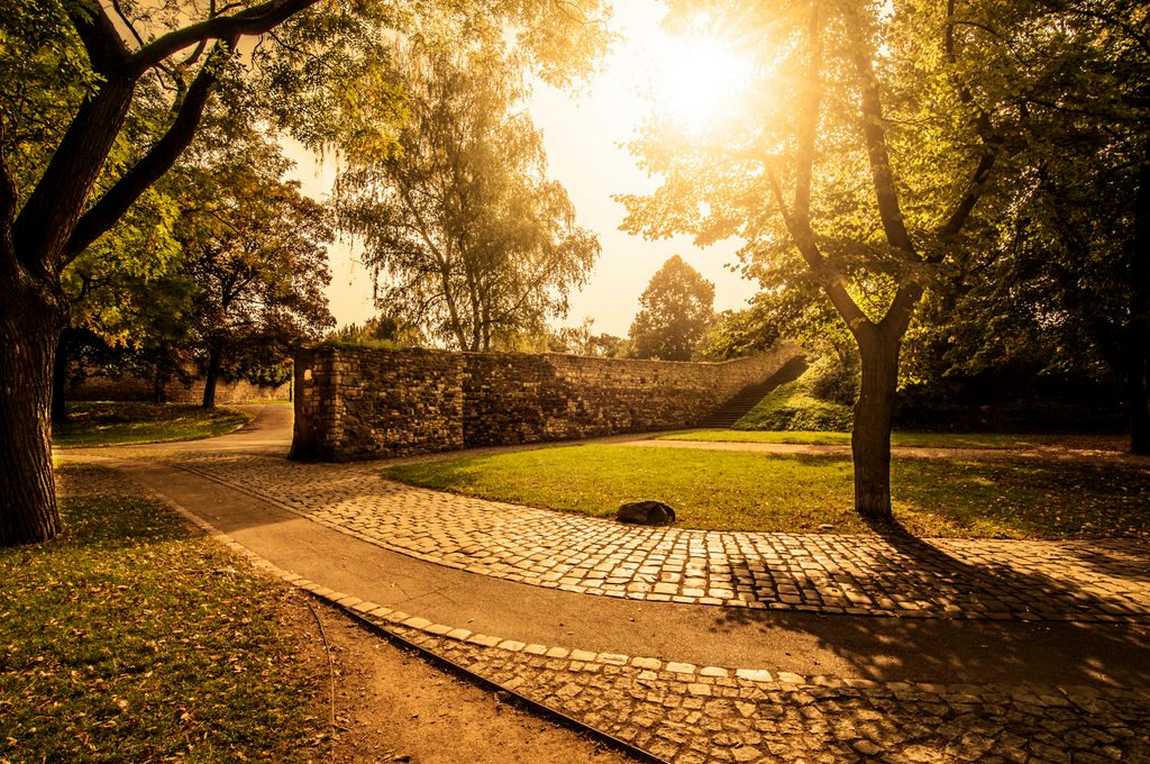 Photo:https://www.facebook.com/prahavysehrad
Photo:https://www.facebook.com/prahavysehrad
The Vysehrad Park
This spot boasts an expansive park that serves as an idyllic retreat for families. The park's breathtaking location on a scenic hill provides enchanting views overlooking the Vltava River and the Botič, offering a panoramic landscape of the Prague Basin. Visitors can explore the park's colorful past, settlements, and various agricultural activities, making it an ideal destination for all ages.
Children often delight in open spaces perfect for a leisurely walk or a summer picnic. The grounds are meticulously maintained, providing a lush, green backdrop for a family day out.
Breathtaking Views
The fortress allows visitors to gaze upon stunning views of the city. The riverbanks provide strategic viewpoints, prevalent during the golden hours of sunset. Each vista offers a unique perspective, capturing the essence of Prague's iconic skyline.
Seasonal Attractions
A calendar full of events transforms this place into a hub of seasonal attractions. Whether outdoor theatre in the summer or traditional markets in the winter, there's something to engage visitors at any time of the year. Also, key park areas are often the site of family-centered activities, enhancing the experience with cultural enrichment and entertainment.
Family Dining Options
When exploring Vyšehrad with family, dining becomes a moment to relish the food and the environment conducive to family bonding. The child-friendly restaurants in Vyšehrad cater to the tastes and comforts of adults and the younger ones.
U Kroka is a cozy spot where the family can enjoy a Czech dining experience. Known for its traditional dishes, they serve mouth-watering schnitzels that the kids usually adore. This family-owned restaurant ensures that every meal is memorable for visiting families.
Families have also praised Restaurace Pod Vysehradem for its hospitable environment. Here, they can savor local cuisine; the reviews speak of a pleasant family lunch following a refreshing walk in the area.
For a quick bite or a delightful cup of coffee during your family adventure, Cafe Citadela offers friendly service and a relaxing spot to take a break. Their selection of cakes could be the perfect treat for children after exploring the historic fortress.
| Restaurant | Known For | Distance from Vysehrad Park | Child-Friendly |
| U Kroka | Diner, European, Czech | 0.2 miles | Yes |
| Cafe Citadela | Coffee, Cakes | 0.1 miles | Yes |
| Restaurace Pod Vysehradem | Czech Cuisine | Nearby | Yes |
Their menus typically accommodate various dietary restrictions, ensuring that all family members can find something delightful, no matter their nutritional needs. Visiting families can rest assured that their dining experiences in Vyšehrad will be as fulfilling as their historical journey through this ancient Prague fortress.
Best Time to Visit
When planning a family outing to Vysehrad in Prague, timing is critical to ensuring an enjoyable experience for adults and children. This historic fortress offers a blend of picturesque scenery, cultural monuments, and spacious areas for children to explore.
Morning Visits: One should consider visiting Vysehrad in the early morning for cooler temperatures and fewer crowds. This time allows families to stroll along the fort's walls. It provides ample opportunities for children to run and play in the open spaces.
Weekday Afternoons: If mornings are not feasible, weekday afternoons are also conducive to family visits. Without the weekend hustle, one can visit critical attractions like the Basilica of St Peter and St Paul and the Vysehrad Cemetery. The afternoons are also perfect for picnics in the lush gardens.
Spring and Fall: The best seasons to visit Vysehrad with children are spring (March to May) and fall (September to November). The mild weather during these months makes it comfortable for children to engage in outdoor activities. The gardens are stunning in the spring with blooming flowers, while the fall offers autumnal colors.
- Opening Hours: Most attractions within Vysehrad are open from 10 am to 4 pm, Tuesday through Sunday, so plan your visit accordingly.
- Tranquil Atmosphere: The peaceful environment at Vysehrad makes it an excellent spot for families seeking a break from the city's buzz.
For updated information on events and specific attractions best suited for children, check the official Vysehrad website before your visit.
Is Vysehrad Worth Visiting?
When planning a family trip to Prague, one might wonder if the historic fort perched above the Vltava River merits a spot on the itinerary. For families seeking a blend of culture, history, and space for their children to roam, it is a destination that offers a tranquil escape from the city's more crowded attractions.
Historical Significance:
First and foremost, the castle offers a window into Czech history, with structures dating back to the 10th century. It is a place where families can stroll through the Vysehrad National Cultural Monument and discuss the historical figures that shaped the nation.
Vysehrad is worth visiting with kids because there are:
- Spacious park provides ample room for kids to play
- Interactive tours geared toward younger audiences
- Seasonal festivals with family-friendly activities
Serene Atmosphere:
Families can enjoy peaceful picnics with picturesque views of the Vltava River. The site's elevation provides a vantage point for taking in the cityscape, minus the bustle of downtown Prague.
For those interested in architecture, the fortress is home to the Basilica of St. Peter and St. Paul, a neogothic marvel, and the adjacent cemetery, the resting place of famous Czechs, showcasing unique and sometimes ornate gravestones that can fascinate visitors of all ages.
Families with kids will find that Vysehrad is a historical gem and a locale ripe with open spaces for children to explore, learn, and play. The relaxed pace is perfect for a family outing, ensuring a memorable experience for adults and children.
Vysehrad is worth visiting for its historical significance, family-friendly atmosphere, cultural insights, and panoramic views. These attributes make Vysehrad a must-see spot for families traveling to Prague. The area's open spaces and less-crowded environment offer a respite from the city's more hectic tourist destinations, making it an ideal setting for family memories.
Encased in myths and legends, the area allows parents and kids alike to immerse in a more tranquil slice of Prague's rich tapestry. Furthermore, the convenient amenities, such as nearby dining options and easy accessibility, ensure a smooth visit for those with children.
Therefore, for families planning their next vacation, adding Vysehrad to the Prague agenda promises a day well spent amidst the echoes of the past, the joy of the present, and the picturesque backdrop of one of Europe's most enchanting cities.
How Long Does It Take to Visit Vysehrad?
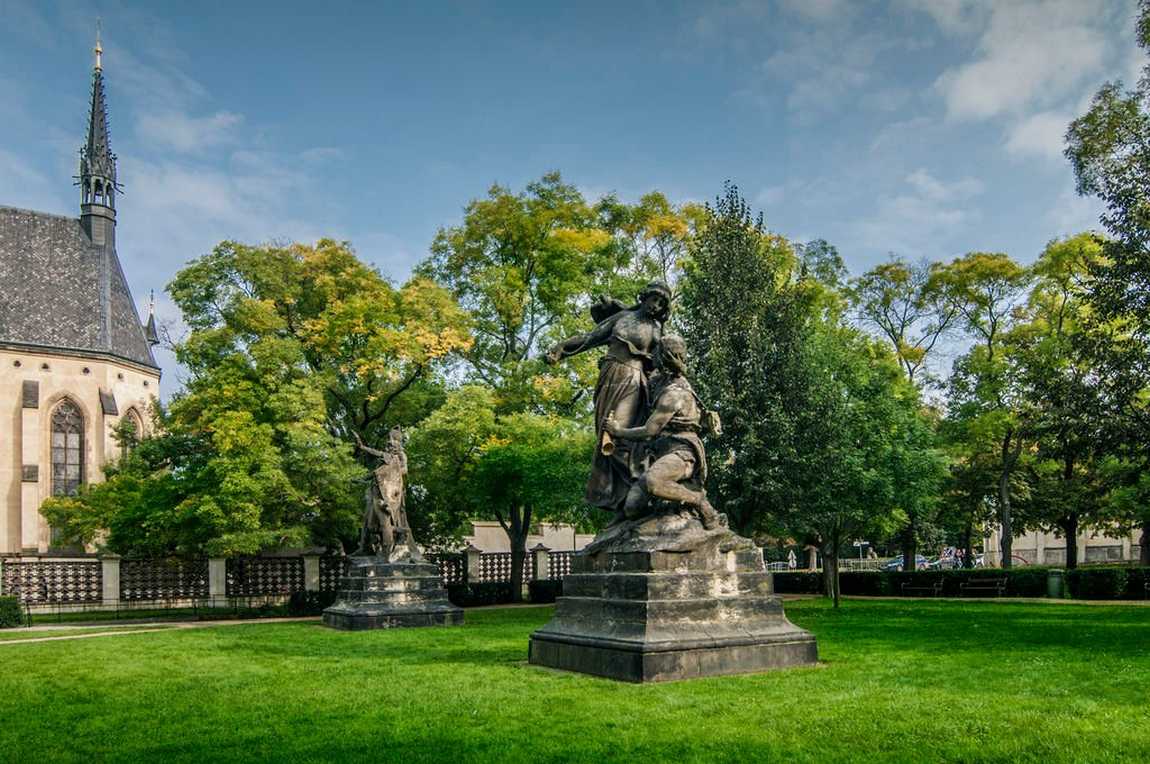 Photo:https://www.facebook.com/prahavysehrad
Photo:https://www.facebook.com/prahavysehrad
When planning a family excursion to the storied ramparts of Vysehrad in Prague, one must consider how much time to allocate for the visit. Ideally, visitors should set aside approximately 2 to 3 hours to fully embrace the serene yet spectacular atmosphere of Vysehrad, ensuring the entire family can enjoy its rich tapestry of history and culture at a leisurely pace.
Suggested Itinerary Breakdown:
- Historical Monuments & Architecture: Dedicate 1 hour to exploring the fortress, including St. Peter and Paul Church and the Vysehrad Cemetery, where Gothic architecture's intricacies and illustrious figures' stories await.
- Parks & Natural Beauty: Reserve 30 minutes for a stroll through the lush, landscaped gardens. The green spaces offer a perfect playground for children and a moment of tranquility for adults.
- Views & Relaxation: Allot 30 to 45 minutes for leisurely soaking in the panoramic views of the Vltava River and Prague’s cityscape, an ideal backdrop for memorable family photographs.
- Food & Refreshments: With young ones in tow, it’s wise to factor in 30 minutes for a snack break. Refreshments can be enjoyed in the quaint cafes dotted around the fortress.
The family can still expect a fulfilling visit if they arrive later in the day. According to experienced visitors, starting the tour by 3:30 pm provides ample time to appreciate the main attractions before closing at 6 pm. Families should remember that while castle's grounds elicit exploration and discovery, the site's operation hours may vary. Therefore, verifying the current opening times before the visit is sagacious.


